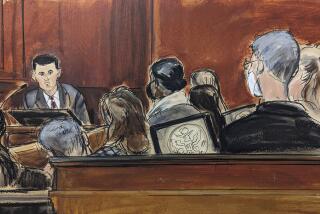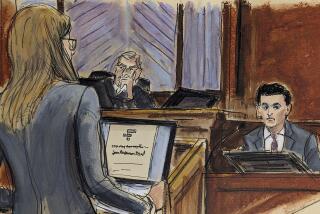Icahn Testifies TWA Breakup Not in Plans
- Share via
NEW YORK — Financier Carl C. Icahn spent more than two hours on the witness stand Friday attempting to convince a federal judge that he would not break up and sell Trans World Airlines if he succeeds in taking it over.
TWA’s lawyers, in questioning him, sought to demonstrate that Icahn still intends to dismantle the carrier.
“I don’t like to liquidate companies,” Icahn said in answer to a question from TWA’s attorney, Robert Zimet. “I don’t like liquidations, per se. “
But he conceded that when he first began acquiring TWA stock last year he did intend to dispose of some of the airline’s assets.
Icahn appeared at the hearing in federal court in TWA’s suit for an injunction to halt his attempted takeover. TWA also sued Icahn in Missouri state court and asked the Department of Transportation to block any further moves by Icahn so the department has time to investigate whether a TWA controlled by Icahn will be fit to carry passengers.
U.S. District Judge John N. Cannella, who asked whether the TWA stockholders weren’t the ones who should decide whether Icahn should take control of TWA, said he would hand down a decision Tuesday.
Icahn said in his testimony that Sanford Rederer, a private airline consultant from Washington, had recommended that he sell some of TWA’s property in any takeover. These included some of the airline’s “non-hub” routes, its Kansas City, Mo., maintenance facilities, between 25 and 30 planes and gate space in such cities as Los Angeles, Boston, Philadelphia and New York, he said.
Icahn said he had not favored Rederer’s recommendations except the suggestion to cut routes and dispose of planes. But he said that, during a May 5 meeting with 10 to 15 senior TWA executives, he changed his mind on those two points as well.
Icahn said that he then told TWA President C. E. Meyer Jr. and the other executives that he might be able to help TWA acquire another airline if he were elected to the board. Icahn said the consultant had told him that TWA was worth between $300 million and $400 million in cash.
“Did he tell you that you could dispose of the assets and in one year pay for the acquisition?” Zimet asked.
“I cannot honestly say it was to be in one year,” Icahn answered. “In my mind it was a few years.”
Icahn told of a suggestion by Rederer last year that he acquire Frontier Airlines but said he had not been interested.
Icahn also said that he probably would not retain Meyer if he is successful in his takeover bid.
“You don’t think that Mr. Meyer is the right guy to be running the airline?” Zimet asked.
“I have been coming to that conclusion,” Icahn replied. “TWA lost money over the last four or five years while others made money.”
Icahn said that one of the reasons he wants to take over the airline is that it is “a great cash generator.”
It could, he said, generate $400 million in cash a year while costing him only $800 million to acquire.
Later, Meyer took the stand and said that, in the last week, the airline’s compensation committee had written so-called golden parachute contracts for 29 senior executives, bringing to 32 the number of TWA executives thus financially protected. Such contracts guarantee generous severance pay for executives in the event of a takeover and make the takeover target less attractive.
“I can’t run the airline by myself,” Meyer said, indicating in an interview after the court session that some senior staff, worried about uncertainty at the airline, might be considering leaving.
In Washington, meanwhile, the chairman of the Senate Commerce Committee, John Danforth (R-Mo.), indicated that he will introduce legislation limiting airline buy-outs despite a letter from Icahn promising that he would not liquidate TWA if he takes it over.
More to Read
Inside the business of entertainment
The Wide Shot brings you news, analysis and insights on everything from streaming wars to production — and what it all means for the future.
You may occasionally receive promotional content from the Los Angeles Times.










